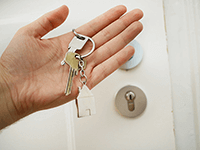
Mortgage applications can feel like a huge and scary task, particularly when you're worrying if you'll get accepted.
It's quite normal to worry in this situation, but there are tactics you can use to improve your chances.
We've summarised some of these key tactics in this blog.
1. Assess your credit report
Make sure you look over your credit report before applying to check that all the information is correct. The last thing you want is to apply and have it rejected based on false information.
It's also a good idea to check even if you're not applying, so that you know what is showing and how you might go about improving your credit score in the future.
2. Look into government buying schemes
Government buying schemes can really help you get on the property ladder, so it is worth thinking about using one of these initiatives to boost your mortgage chances.
There are a few different schemes available called Lifetime ISAs, Help to Buy ISAs, Right to Buy and Shared Ownership. Each of the schemes can help you in different ways from boosting your deposit savings to allowing you to purchase properties at discounted rates.
It is worth researching which schemes you are eligible for to see if you can take advantage of the benefits these can bring.
3. Limit the number of credit applications you make
When you apply for finance lenders will perform a credit search on you to determine whether you are a reliable borrower. If the lender completes a hard credit search it will be visible on your record. This means that other providers (including your new lender) are able to see it.
Although this may not seem like a major issue, it can be problematic if you have lots of hard credit searches on your record in a short space of time. This is because it indicates to lenders that you may have financial problems. Therefore, it is critical that you try to limit the number of credit applications you make before applying for a mortgage.
4. Avoid making any late payments on your bills
A big factor lenders will consider when assessing your mortgage application is your credit history. It's therefore important that you try to build a good credit history in order to increase your chances of success.
Making payments late or missing them altogether can negatively impact your credit score, so it is vital that you try to avoid this at all costs.
If you're in a position where you have missed or late payments on your file, then don't panic. There are still solutions available that can assist in circumstances where bad credit is involved.
We offer a range of specialist mortgage options that can help you if you have complex circumstances, including bad credit.
5. Assess your financial links
Many people are financially linked to others through joint bank accounts, mortgages and loans. Although this is quite common, it's important to be aware that their actions can impact your credit score too. For example, if they were to ever miss payments or make late payments on your joint loan, this would also show on your record.
When applying for a mortgage it is therefore important to assess your financial associations and determine whether you still need to be linked to them.
6. Close any accounts you no longer use
Another factor to consider is closing down old bank accounts you no longer use. Having accounts like these open can be really harmful to your application, so it's important to make sure you shut them down if they're not in use.
7. Monitor spending habits before you apply
Lenders will also look over some of your recent bank statements to assess your monthly outgoings, in order to determine how much you would be able to afford.
Due to this, if you are spending lots of money in the lead up to applying for a mortgage it may decrease your chance of success or lower the amount lenders will allow you to borrow. It is therefore important that you closely monitor your outgoings and try to reduce your spending wherever you can.
8. Avoid going in your overdraft
Going in your overdraft can signal to lenders that you are unable to make your current financial commitments. Consequently, it will be difficult for lenders to see how you would be able to comfortably afford mortgage payments. Therefore, they may consider you to be a higher financial risk, meaning that your chances of success are decreased. To avoid this, it's important that you try to stay out of your overdraft.
Summary
All in all, there are a variety of different tactics you can use to improve your mortgage chances. By using these methods, you may find it easier to get accepted and may qualify for a better deal.
Think carefully before securing other debts against your home. Your home may be repossessed if you do not keep up repayments on a mortgage or any other debt secured on it.




